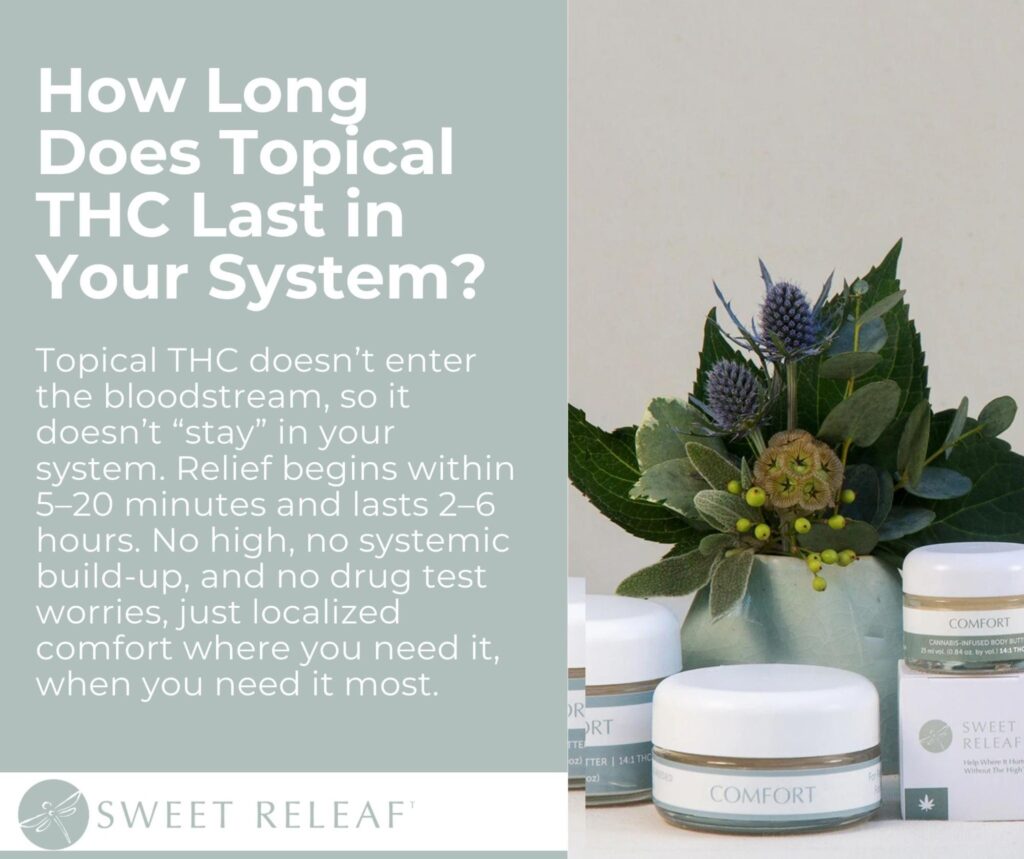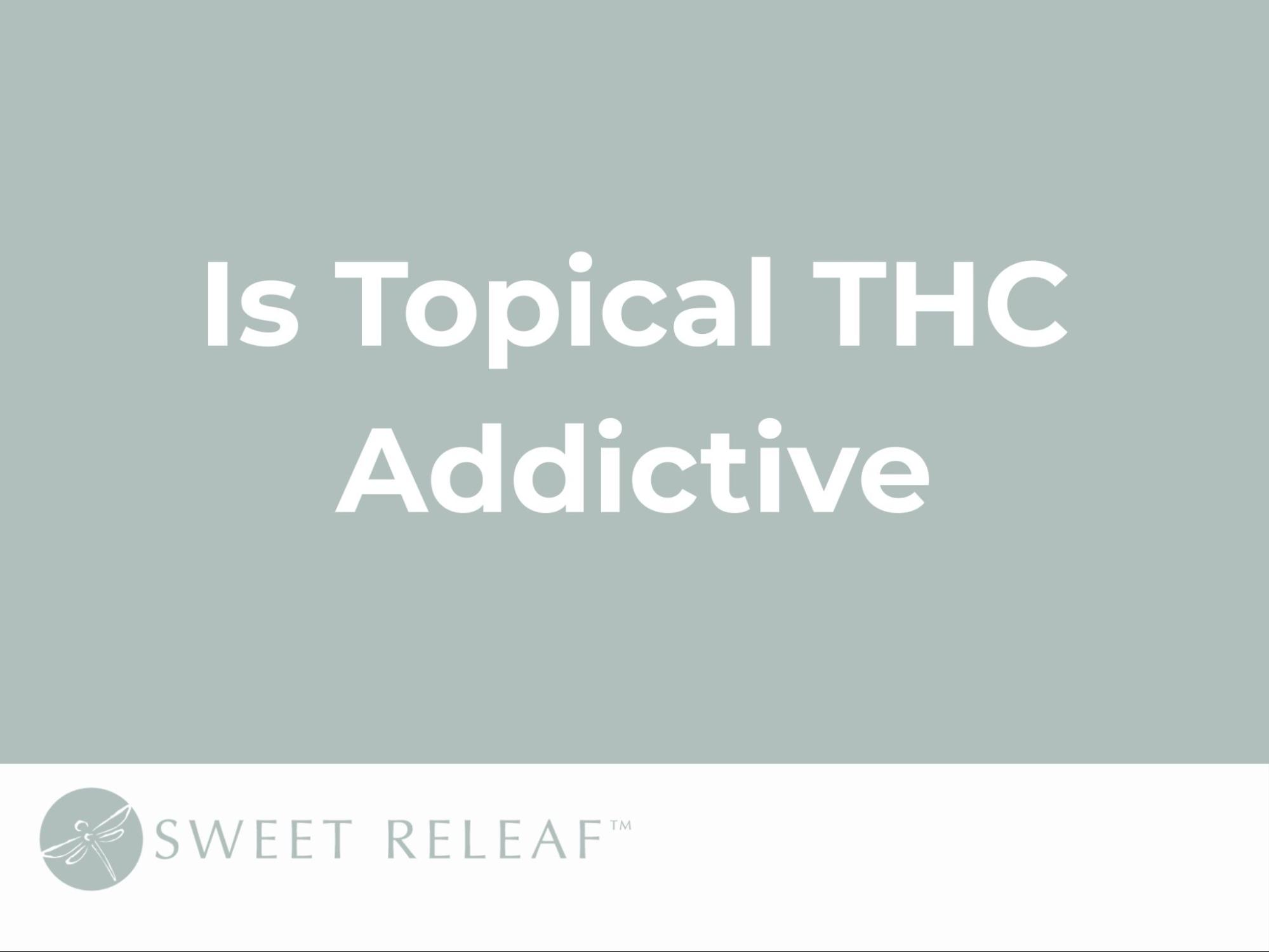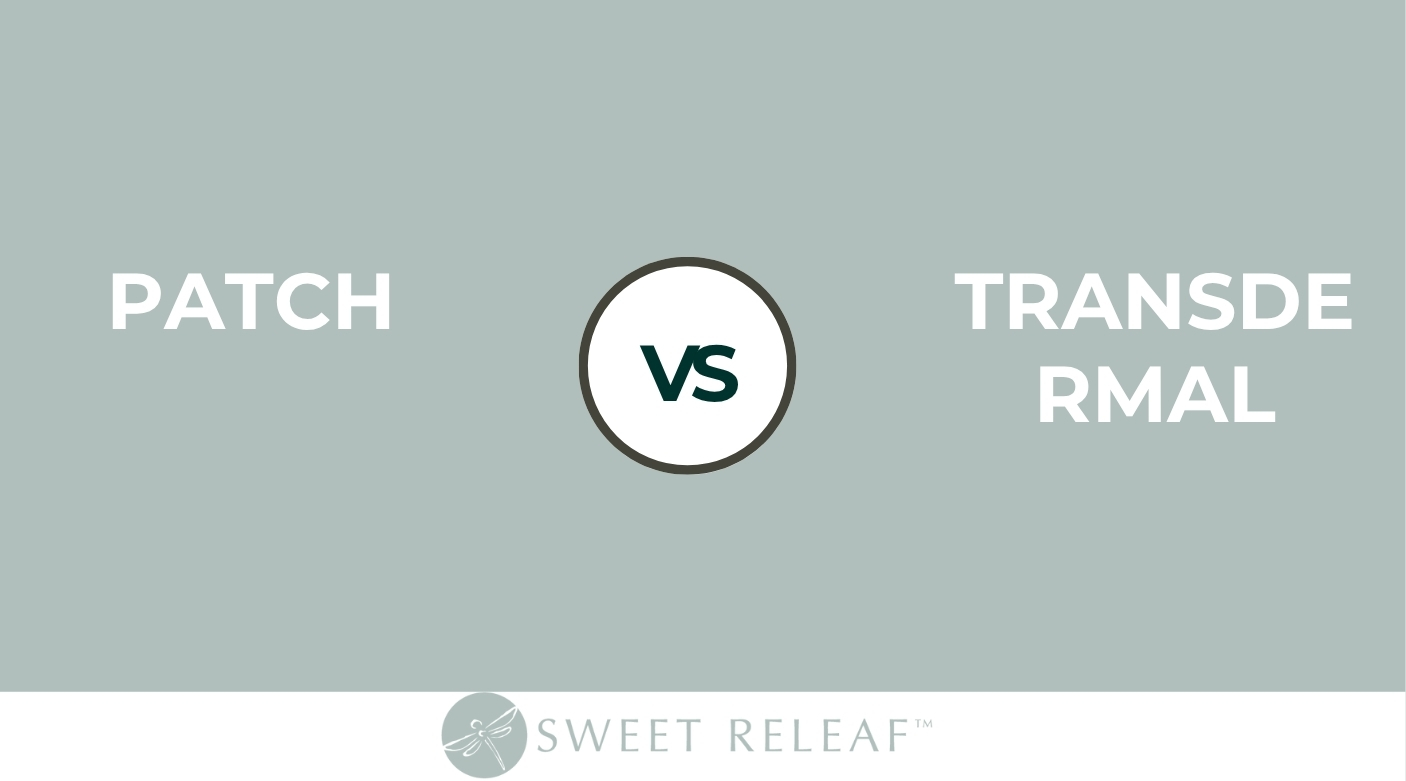Topical THC typically does not enter your bloodstream or show up on drug tests. It works at the surface, offering localized pain relief without any high, and fades within a few hours.
But not all products are created equal, and not all “topicals” are truly topical.
Whether you’re applying a THC cream for joint pain, managing post-surgical inflammation, or simply avoiding pills, it’s key to know how long those effects last and what risks, if any, come with them.
Because, depending on the product’s formulation, the difference between “safe and discreet” or “oops, failed a drug test” can be a single ingredient.

Here’s what that means in real life, depending on your situation:
- Drug Testing Concerns: Most true topicals won’t trigger a test, but transdermal patches or mislabeled creams might.
- Avoiding Psychoactive Effects: Standard THC topicals don’t get you high, even at high doses.
- Ensuring Safety for Seniors or Kids: Non-transdermal formulas are safe to use around others, without risk of transfer or side effects.
- Exploring Non-Invasive Pain Relief: THC topicals are a powerful alternative for those avoiding opioids or over-the-counter painkillers.
- Comparing to Other Cannabis Methods: Unlike smoking or edibles, topicals don’t circulate in your bloodstream, making them safer and more targeted.
We’ve spent years refining non-psychoactive, high-THC topicals that deliver deep relief without crossing into your system.
Our emulsion formulas are engineered to stay localized, meaning you can feel better without risking a thing.
If you want the full breakdown of what happens when you apply THC to your skin, how long it lasts, what to avoid, and how to make the safest choice, keep reading.
What Happens When You Use THC Topically?
The Science of Topical Absorption
Topical THC works with the body’s natural systems, specifically the CB2 receptors located throughout your skin and peripheral tissues.
These receptors are part of your endocannabinoid system, which helps regulate inflammation, pain, and healing.
When you apply a THC-infused cream, the cannabinoids bind to these receptors at the site of application.
Unlike smoking or ingesting cannabis, the THC does not travel into your bloodstream, unless the product is intentionally made to do so (such as a transdermal patch).
That means the effects are highly localized. It’s not about mood elevation or euphoria; it’s about soothing muscles, calming joints, and easing tension right where you apply it.
Think of it like Bengay or Tiger Balm, but with the anti-inflammatory power of cannabis.
What About Getting High?
Let’s put this one to rest: you won’t get high from a standard THC topical.
You could use it every day, even in high concentrations, and never feel the buzz associated with cannabis. That’s because it never reaches your brain.
This is why so many of our Sweet Releaf users feel comfortable applying Comfort+ before work, using Comfort Warms pre-workout, or even treating chronic pain while caring for grandkids.
No dizziness. No sedation. Only clear-headed comfort, so you can keep living your life.
Will Topical THC Show Up on a Drug Test?
The Risk Is Low, But Not Zero
For most people using non-transdermal THC topicals, the answer is simple: no, you won’t test positive.
These formulations are designed to work at the skin level, delivering relief without crossing into your bloodstream.
And since drug tests only detect THC metabolites that circulate internally, you’re in the clear.
But here’s the catch: not all THC creams are created equal.
Some are marketed as “topicals” but actually use transdermal delivery systems, which are specifically designed to push cannabinoids through the skin barrier and into your bloodstream.
These can absolutely show up on a drug test.
How do you spot the difference?
Check the label. If you see terms like “nano-emulsified,” “transdermal carrier,” or “deep-penetrating technology,” that’s a signal the product might enter your system.
When in doubt, reach out to the company. We are always transparent about our ingredients and delivery methods.
What About DIY THC Creams?
Homemade topicals, like THC-infused coconut oil or salves made from decarbed flower, are a whole different story.
While many folks make them for personal use, the consistency and safety of these formulations can vary wildly.
Because DIY topicals often lack barrier stabilizers or controlled emulsion techniques, they may allow trace amounts of THC to slip into the bloodstream, especially if applied to broken, inflamed, or mucous-prone areas like cuts or around the eyes or groin.
If you’re subject to testing or unsure about the formulation, it’s smarter to use a lab-tested, professionally formulated product.
Our Sweet Releaf emulsions are designed to stay where they’re needed, on the surface, not in your system.
How Long Does Topical THC Last?
Onset and Duration
When applied to clean, dry skin, a well-formulated THC topical usually starts working within 5 to 20 minutes.
You may feel warmth, tingling, or just a subtle easing of the pain and tension in the area you’ve treated.
The relief typically lasts between 2 to 6 hours, depending on where you apply it, the condition you’re treating, and the quality of the formula.
For example, areas with more muscle tension or inflammation (like shoulders or lower back) may require more frequent reapplication.
And here’s something many people worry about:
Can THC from topicals accumulate in fat and cause delayed test failure?”
Not unless it’s transdermal. Topical THC does not reach the bloodstream, so there’s no internal build-up, no matter how often you apply it.
Even daily use won’t create the kind of metabolite storage you’d see with smoking or edibles.
How Long Does Transdermal THC Stay in the Body?
Now, transdermal is a different beast. These products are designed to behave more like a slow-release edible, entering your bloodstream gradually through the skin.
That means your body treats them like any other ingested THC product.
Depending on your metabolism, body fat, frequency of use, and dosage, transdermal THC may remain detectable in your system for anywhere from 1 to over 30 days.
If you’re navigating drug testing or legal concerns, it’s critical to know what you’re using.
When in doubt, steer clear of anything labeled as transdermal, or stick with trusted brands like Sweet Releaf that clearly state their non-transdermal approach.
Common Misunderstandings, and Real Risks
When it comes to cannabis topicals, confusion is common and understandable. Here’s what you really need to know so you can use them with confidence.
If I touch someone else’s THC cream, will I fail a test?
No, simply touching a standard topical is not enough to affect your system.
Even if you’re the one applying it to someone else, THC won’t pass through your skin into your bloodstream, especially with proper handwashing.
The only real risk would be if you were repeatedly applying large amounts to broken or damaged skin, which might allow for increased absorption.
In most real-world scenarios, especially with healthy skin, the transfer risk is negligible.
Are all cannabis creams the same?
Absolutely not. A body butter is not a patch, and a standard topical is not a transdermal.
Transdermal patches are made to penetrate all the way through your skin, enter your bloodstream, and deliver a steady dose of THC, often leading to psychoactive effects and detectable metabolites.
Sweet Releaf, for example, formulates emulsion-based body butters that act only on the outer tissue layers. You feel it in your joints, not in your head.
What if I have a rash or cut?
Using topicals on inflamed, broken, or irritated skin can increase permeability.
That means THC has a slightly higher chance of slipping into your bloodstream, especially if the formula includes strong absorption enhancers.
This is one reason we avoid harsh preservatives or synthetic carriers in our Sweet Releaf formulas. We want you to experience relief, not side effects.
Real-World Use Cases from the Sweet Releaf Community
If you’re wondering whether topical THC actually works without getting into your bloodstream, here’s what we hear from real customers, every week.
For Everyday Aches
After a long day working in the garden or climbing up a ladder for yet another DIY project, you don’t want to pop another pain pill.
That’s where Comfort+ Extra Strength comes in. One of our regulars swears it’s “like an eraser for back pain,” and it kicks in fast, often within 10 minutes.
No high. No grogginess. Only freedom to finish the day.
For Post-Surgical Recovery
When my mom Didi underwent carpal tunnel surgery, she needed something gentle yet powerful to manage her healing process.
Our body butter formula, created for her, originally became her go-to for calming inflammation and easing nerve pain without compromising alertness or mobility.
It helped her sleep better, recover faster, and stay off harsh pharmaceuticals.
For Senior Mobility
One story that still gets me: a 92-year-old customer who hadn’t danced in over a year due to joint pain. After trying Sweet Releaf, she called just to say, “I danced in the kitchen today.” That’s the kind of impact that keeps us going.
These are Only a few reminders that pain relief doesn’t have to come at the cost of your lifestyle, or your clarity.
Sweet Releaf Topicals, Relief Without the Risk
We know pain is personal, and so is trust. That’s why every formula we make is designed with both effectiveness and safety in mind.
Our Comfort+ Extra Strength Body Butter and Comfort Ayurvedic Roll-Ons rely on a precise emulsion technique to go deeper into the skin’s surface layers, delivering fast, targeted relief without crossing into your bloodstream. That means:
- Deep penetration for real pain relief, not surface-level numbness
- Fast-acting comfort that lasts for hours
- Complete confidence in your ability to drive, parent, or show up fully at work
Unlike many brands that rely on distillates or isolates, we use full-spectrum, sungrown cannabis oil, paired with carefully chosen Ayurvedic botanicals that support circulation, muscle relaxation, and skin health.
Our products are free from preservatives, synthetic chemicals, and anything you wouldn’t want absorbing into your skin.
In short: no high, no toxins, and no compromises, only powerful, plant-based pain relief.
Takeaways Before You Apply
- Topical THC doesn’t last long in your system, because it never actually enters your system. It stays at the skin’s surface, working with your body’s natural receptors to provide fast, targeted relief.
- If drug testing is a concern, always avoid products labeled “transdermal,” “nano,” or “deep-penetrating.” These are made to bypass the skin barrier and can leave detectable THC in your bloodstream.
- And if you’re looking for chronic pain relief without the high, look no further than Sweet Releaf. Our emulsion-based body butters and roll-ons are trusted by everyone from post-op patients to aging athletes and weekend warriors who need relief they can count on, without the risk.
Whether you’re navigating a recovery, staying active through aging, or done with pharmaceutical side effects, Sweet Releaf offers a path forward.
One that’s grounded in science, whole-plant medicine, and a deep respect for the people we serve.
Pain may be personal, but relief can be shared. And we’re honored to be part of that for you.




